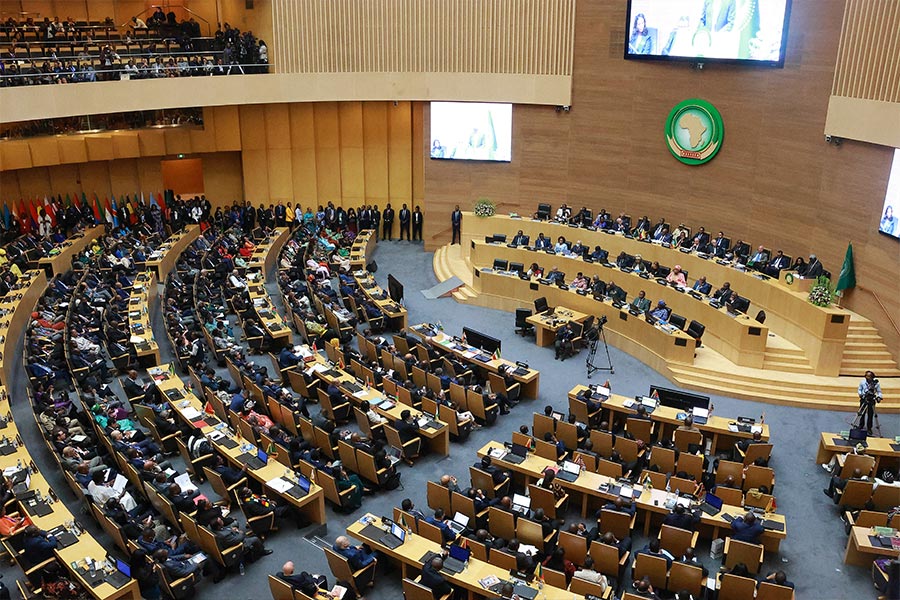
Apr 28 , 2024
By Kidist Yidnekachew
Engrossed in thought, I was abruptly pulled back to reality by a booming male voice. The raw passion in his tone was captivating, sparking my curiosity about the source of his fervour.
Unknowingly eavesdropping, I discovered he was venting about a lack of recognition at work. In his view, colleagues who contributed less to a recent project were receiving praise, while his efforts were seemingly ignored. The frustration was palpable. Here was someone who poured his heart into his work, only to be disregarded when rewards were handed out.
As he continued, he questioned if his past dedication to anonymity had somehow rendered his contributions invisible. There was a melancholic mix of anger and sadness in his voice as he recounted his numerous, previously uncredited, efforts. The once unimportant recognition now felt essential as promotions and raises materialised. He had gone above and beyond but remained stagnant while colleagues with lesser contributions were lauded.
Empathy tugged at me. Though a glimpse of his back was all I managed before he disappeared, his story lingered. It resonated deeply, a reflection of the silent struggles many face. This encounter sparked a contemplation on the interplay between recognition and anonymity, and their impact across different aspects of life.
Some actively seek the spotlight, basking in the glow of acknowledgement for their achievements. Others, however, find solace in anonymity, deriving satisfaction from the intrinsic rewards of their work. Anonymity can be liberating, allowing individuals to focus purely on the act of creation or contribution, unburdened by the pressure of external validation.
This intrinsic motivation is prevalent in artistic endeavours, where the focus might be on igniting social dialogue rather than individual recognition. Similarly, open-source contributors might find greater satisfaction in the collective benefit created by their code, rather than personal fame. Anonymity can be a shield for whistleblowers or activists, protecting them from retaliation in their fight for social justice.
For some, the prospect of recognition can trigger social anxiety, creating an aversion to the fanfare of public speaking or awards ceremonies. Introverts or those with social anxieties might find solace in the quiet satisfaction of accomplishment, without the accompanying spotlight. The pursuit of recognition is highly individual, driven by personal motivations.
Some see recognition as a stepping stone to career advancement, while others seek validation to combat feelings of inadequacy. In extreme cases, the desire for credit can morph into unhealthy behaviours, leading to unethical actions like plagiarism or taking credit for another's work.
Individuals might become fixated on self-aggrandisement, resorting to manipulation or plagiarism to claim achievements they never earned. Their fragile sense of self hinges on external validation, even if obtained through dishonest means. The issue of credit becomes complex in collaborative settings, where multiple individuals contribute to a shared goal. Striking a balance between recognising the collective effort and acknowledging individual contributions is crucial.
The pursuit of recognition can be a powerful motivator, but nurturing humility is equally important. Leaders who genuinely appreciate their team members foster a more collaborative and encouraging environment. Imagine a CEO who takes the time to acknowledge the accomplishments of their staff, creating a culture where everyone feels valued and inspired to make a difference.
The yearning for acknowledgement and the inclination for anonymity are not inherently positive or negative. They are both expressions of the human desire for significance and purpose. By understanding the motivations behind these contrasting attitudes, individuals can navigate the complexities of recognition in both personal and professional spheres.
PUBLISHED ON
Apr 28,2024 [ VOL
25 , NO
1252]


Life Matters | May 13,2023

My Opinion | Jul 30,2022

Commentaries | Mar 02,2019

View From Arada | Feb 24,2024

Life Matters | Dec 29,2018

Fortune News | Oct 11,2020

My Opinion | Sep 11,2020

Radar | Sep 17,2022

Radar | May 20,2023

Fortune News | Mar 14,2020

My Opinion | 131451 Views | Aug 14,2021

My Opinion | 127803 Views | Aug 21,2021

My Opinion | 125783 Views | Sep 10,2021

My Opinion | 123419 Views | Aug 07,2021

Dec 22 , 2024 . By TIZITA SHEWAFERAW
Charged with transforming colossal state-owned enterprises into modern and competitiv...

Aug 18 , 2024 . By AKSAH ITALO
Although predictable Yonas Zerihun's job in the ride-hailing service is not immune to...

Jul 28 , 2024 . By TIZITA SHEWAFERAW
Unhabitual, perhaps too many, Samuel Gebreyohannes, 38, used to occasionally enjoy a couple of beers at breakfast. However, he recently swit...

Jul 13 , 2024 . By AKSAH ITALO
Investors who rely on tractors, trucks, and field vehicles for commuting, transporting commodities, and f...

Jun 28 , 2025
Meseret Damtie, the assertive auditor general, has never been shy about naming names...

Jun 21 , 2025
A well-worn adage says, “Budget is not destiny, but it is direction.” Examining t...

Jun 14 , 2025
Yet again, the Horn of Africa is bracing for trouble. A region already frayed by wars...

Jun 7 , 2025
Few promises shine brighter in Addis Abeba than the pledge of a roof for every family...

Jun 29 , 2025
Addis Abeba's first rains have coincided with a sweeping rise in private school tuition, prompting the city's education...

Jun 29 , 2025 . By BEZAWIT HULUAGER
Central Bank Governor Mamo Mihretu claimed a bold reconfiguration of monetary policy...

Jun 29 , 2025 . By BEZAWIT HULUAGER
The federal government is betting on a sweeping overhaul of the driver licensing regi...

Jun 29 , 2025 . By NAHOM AYELE
Gadaa Bank has listed 1.2 million shares on the Ethiopian Securities Exchange (ESX),...